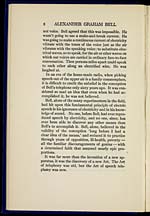Alexander Graham Bell (1847-1922)
Alexander Graham Bell : the man who contracted space
8
ALEXANDER GRAHAM BELL
not voice. Bell agreed that this was impossible. He
wasn’t going to use a make-and-break current. He
was going to make a continuous current of electricity
vibrate with the tones of the voice just as the air
vibrates with the speaking voice: to substitute elec-
trical waves, so to speak, for the air or ether waves on
which our voices are carried in ordinary face-to-face
conversation. Then persons miles apart could speak
to each other along an electrified wire. He was
laughed at.
In an era of the home-made radio, when picking
speech out of the upper air is a family commonplace,
it is difficult to credit the unbelief in the conception
of Bell’s telephone only sixty years ago. It was con-
sidered so mad an idea that even when he had ac-
complished it, he was not believed.
Bell, alone of the many experimenters in the field,
had hit upon this fundamental principle of electric
speech in his ignorance of electricity and in his know-
ledge of sound. No one, before Bell, had ever repro-
duced speech by electricity, and no one, since, has
ever been able to discover any other means than
Bell’s to accomplish it. Bell, alone, believed in the
validity of the conception ‘long before I had a
clear idea of the means,’ and reduced it to practice
through years of opposition, ill-health, poverty —
all the familiar discouragements of genius — with
a determined faith that assumed nearly epic pro-
portions.
It was far more than the invention of a new ap-
paratus, it was the discovery of a new Art. The Art
of telephony was old, but the Art of speech tele-
phony was new.


